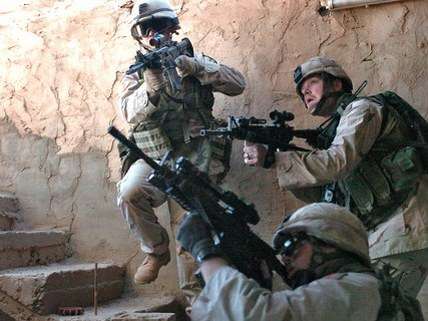Will the US Need Troops on the Ground Against ISIS After All?

In his speech announcing a stepped up campaign against ISIS/ISIL/Islamic State/the bloodthirsty loons running around in Iraq and Syria, President Obama reassured listeners that the United States' efforts' "will not involve American combat troops fighting on foreign soil." That's a reassuring note for a public that, after more than a decade of war, has become remarkably less bellicose than its political figures. The war fatigue holds true even with increased nervousness over ISIS' gains; Americans favor action, but they prefer airstrikes over troops on the ground. But crowd-pleasing as restricting military action to death from the sky may be, national security experts don't see that as an especially effective strategy. In fact, several of them told the Washington Times that such a limited approach is doomed from the start.
Maybe the pithiest comment comes from Larry C. Johnson, a former CIA analyst who served in the State Department's Office of Counterterrorism under the first President Bush. "What a waste of time," Johnson told the Times. "We have not learned a thing in 80 years. [The Islamic State] is an army. The air power is not going to get the job done. Until you put troops in and kill these guys, they're going to continue. They adjust to tactics. They meld into [the] civilian population."
President Obama did say his plan incolved a commitment to "support Iraqi and Kurdish forces." But those would be the same Iraqi troops who abandoned bases and equipment in fear of approaching ISIS forces. The Kurds have a better record—but they're just about holding their own against ISIS with western support. Are they and whatever Syrian factions the U.S. favors with military assistance really going to "degrade and ultimately destroy," in Obama's words, a "terrorist group" that's looking increasingly like the army of a sandy competitor to North Korea for the title of shittiest country on Earth?
For that matter, does anybody remember former Defence Secretary Donald Rumsfeld conceding in 2003 that officials underestimated the size of the job in Iraq at that time, even as we raised ground forces committed there to 150,000 troops?
That's not to say that the United States should commit to putting large numbers of combat troops in the Middle East. Again. But it does mean that American presidents probably should give more thought to the size of the checks they'll need to write to cover the promises they make.


Show Comments (120)